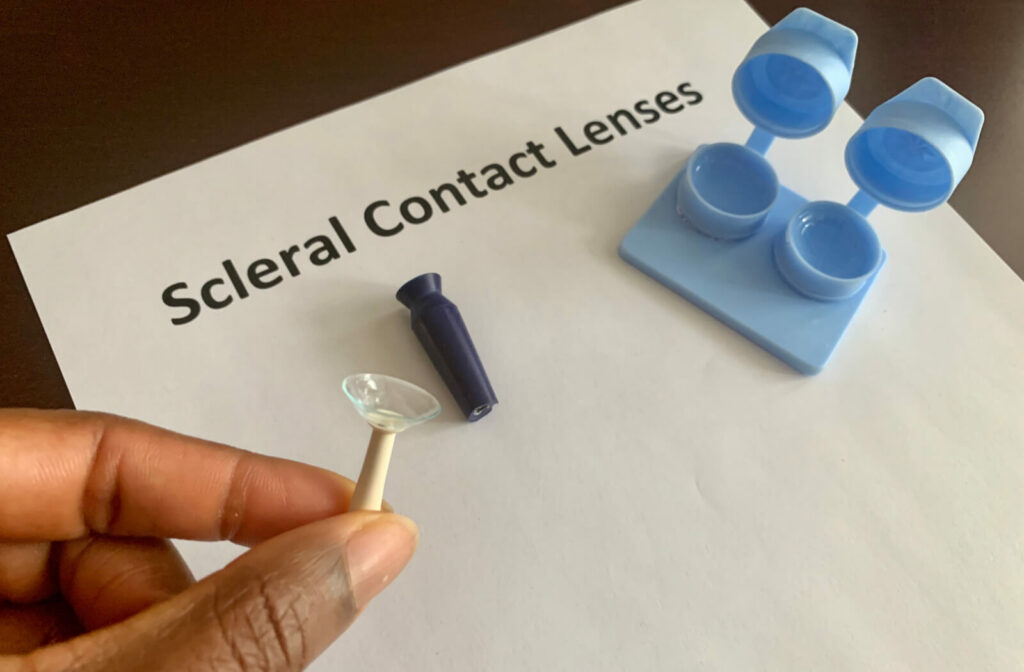Several eye conditions may require corrective measures like eyeglasses. And astigmatism is a common refractive error that glasses can also correct. But can you wear contacts to correct astigmatism? There isn’t really a simple yes-or-no answer.
Traditional soft contact lenses aren’t typically recommended if you have severe astigmatism. But some contact lens options, such as toric lenses, scleral lenses, or hybrid lenses, may be an option.
Or your eye doctor could recommend refractive laser eye surgery if you’d prefer to avoid eyeglasses or contacts altogether. But a comprehensive eye exam is the first step because your optometrist has to review your overall eye health and other factors before making their recommendation for your needs.
What Is Astigmatism?
Astigmatism is a common refractive error that many people have to some degree. It’s caused by the cornea, or front surface area of the eye, having an oval or cylindrical shape instead of being round.
This misshapen cornea causes light to refract incorrectly, which makes it difficult for the eye to focus properly. Astigmatism often occurs alongside other refractive errors like near or farsightedness.
There isn’t one answer to why a person might develop astigmatism. There is a small genetic component, but other factors, like pressure on the cornea from the eyelid or injuries, could also cause astigmatism to develop later in life.
But astigmatism typically develops early in life, so kids should get regular eye exams to keep up with any eye or vision changes.
Symptoms of Astigmatism
You may not notice any symptoms if you have mild astigmatism. And your symptoms may vary if you have other eye conditions, such as myopia. But the most common symptoms of astigmatism include:
- Blurry vision
- Squinting to see clearly
- Eye strain
- Headaches
- Low night vision
Correcting Astigmatism
There isn’t a single best way to correct or treat astigmatism. Your eye doctor will make recommendations based on your eye health, vision needs, and lifestyle.
Glasses
Eyeglasses are often the most effective and lowest-risk correction method for refractive errors. The nice thing about prescription glasses is they can correct multiple conditions with one lens. For example, if you have nearsightedness and astigmatism, the lenses can be made to correct both refractive errors.
Contact Lenses
Contact lenses can be a great option for astigmatism, especially for those who play sports or wear protective eyewear for work. Traditional soft contact lenses aren’t typically effective for correcting astigmatism, but a few specialty lenses are available specifically for astigmatism.
Refractive Eye Surgery
Glasses and contacts only correct the vision problems caused by astigmatism. But refractive laser eye surgery may be a good option if you’re looking for a more permanent fix instead of just correction. Your eye doctor can review several types of laser eye surgery with you. Your overall eye health and degree of astigmatism can affect which procedures you’re a candidate for.

Wearing Contact Lenses with Astigmatism
Astigmatism makes fitting contact lenses a bit complicated, but there are some good lens options to help you see clearly without glasses.
Toric Lenses
Toric lenses are often a great choice for correcting astigmatism because of their unique shape. They’re designed to focus light differently than traditional contact lenses. They are designed to sit on your eye and align specifically with your cornea.
Scleral Lenses
Scleral lenses are an excellent option if you’re dealing with chronic dry eyes and want to wear contact lenses. But they can also be a good option for correcting astigmatism because of their unique design.
Scleral lenses are specialty gas-permeable lenses that vault over the cornea and rest on the white part of the eye—the sclera. They don’t touch the cornea like other contact lenses. Instead, there is a small pocket of solution designed to allow the light to focus better.
Rigid Gas-Permeable Lenses
Rigid gas-permeable lenses (RGP) are specialty contact lenses made of a rigid, durable material that allows oxygen to pass through to the cornea. They can be an excellent option for correcting astigmatism and come in different styles.
Hybrid Contact Lenses
Hybrid contact lenses are a type of contact lens that combines features of both rigid gas permeable (RGP) lenses and soft contact lenses. The rigid center helps correct astigmatism and provides clear and crisp vision, while the soft outer zone enhances comfort and lens stability. They can be an excellent option for correcting astigmatism and come in different styles.
Discuss Your Correction Options with Your Optometrist
Astigmatism isn’t typically a complicated eye condition to correct or fix, but it’s important to find the solution that works best for you. The best treatment depends on factors like your eye health, the degree of astigmatism, and your vision needs.
Regular eye exams play an important role in ensuring your prescription is current. If it’s time for you or your child’s eye exam or you’ve been experiencing symptoms of astigmatism, book an appointment with us today. The professional team at River Heights Eye Care can get you in to see one of our optometrists to discuss your concerns.


